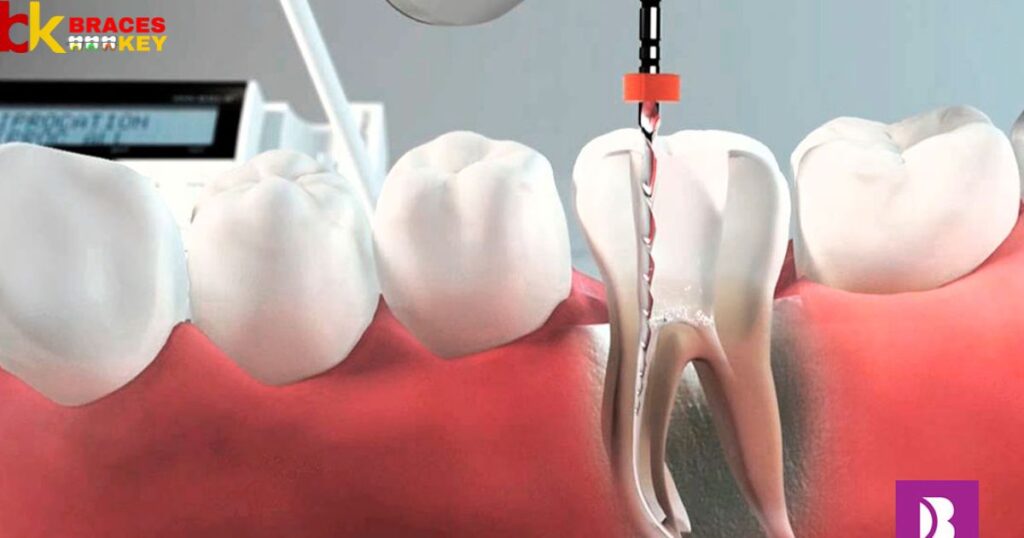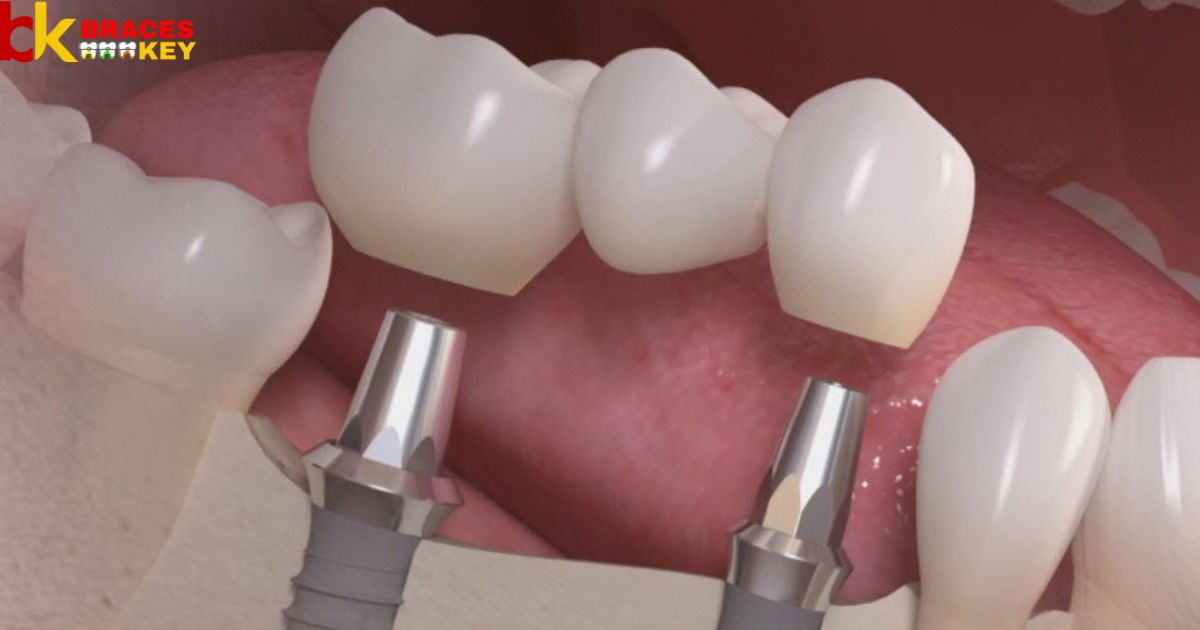A root canal is a dental procedure designed to treat infections or damage within the pulp of a tooth. This process involves the removal of the affected tissue, disinfection, and sealing to save the tooth.
Many individuals wonder, “Can you get a root canal with braces?” It’s a valid concern for those navigating the world of orthodontics and dental health. Let’s delve into the intricacies of this dental dilemma.
Having braces doesn’t directly prevent you from getting a root canal. Braces focus on repositioning teeth and improving their alignment, while a root canal addresses issues within a tooth itself. However, the presence of braces may slightly complicate the process due to the additional hardware in your mouth.
Understanding Root Canals and Braces
Understanding the relationship between root canals and braces is essential for those undergoing orthodontic treatment. Braces may complicate the root canal process, as adjustments might be necessary to accommodate the hardware.
Root Canal: A Closer Look

A root canal, also known as endodontic therapy, is a dental procedure aimed at saving a severely damaged or infected tooth. During this procedure, the dentist removes the infected pulp, cleans the interior of the tooth, and seals it. This prevents the spread of infection and alleviates pain, ultimately preserving the tooth.
Braces: The Orthodontic Solution
Braces, on the other hand, are orthodontic devices designed to correct misaligned teeth and jaw issues. They consist of brackets, wires, and rubber bands that apply pressure to gradually move teeth into their proper positions.
Can You Get a Root Canal with Braces
Now that we’ve examined the basics let’s answer the burning question: can you get a root canal with braces? The short answer is yes, you can. However, there are several factors to consider:
Stage of Orthodontic Treatment
The stage of your orthodontic treatment plays a significant role in determining whether you can get a root canal with braces. If you’re in the initial stages and have just had your braces put on, your orthodontist may recommend postponing the root canal until your teeth have shifted to a more favorable position. This ensures that the root canal procedure does not interfere with the orthodontic treatment.
Type of Braces
The type of braces you have can also influence the decision. Traditional metal braces are more robust and may interfere less with a root canal procedure compared to some other types like clear aligners or lingual braces. Your orthodontist will evaluate the compatibility of your braces with the root canal and advise accordingly.
Orthodontist and Dentist Collaboration

Effective communication and collaboration between your orthodontist and dentist are paramount. Both professionals need to work in sync to ensure that the root canal does not impede your orthodontic progress. They will develop a treatment plan that minimizes any potential disruption.
Extent of Dental Issues
The severity of your dental issues also matters. If the tooth in need of a root canal is not a pivotal part of your orthodontic treatment plan, it might be more straightforward to proceed with the root canal. Your orthodontist and dentist will assess the situation to make an informed decision.
The Process of Getting a Root Canal with Braces
Getting a root canal with braces involves a coordinated effort between your orthodontist and endodontist. First, any necessary adjustments to your braces will be made to ensure a smooth procedure. During the root canal, you’ll likely experience minimal discomfort, and your dental team will work to make the process as seamless as possible.
Consultation
Your journey begins with a consultation with both your orthodontist and dentist. During this meeting, they will discuss the treatment plan, taking into consideration your braces and the necessity of the root canal.
X-Rays and Examination

X-rays and a thorough dental examination will be conducted to assess the condition of the affected tooth. This step is crucial for determining the extent of the damage or infection.
Root Canal Procedure
If the decision is made to move forward, the root canal procedure will be scheduled. During the procedure, the dentist will numb the area around the tooth, remove the infected pulp, and clean the interior of the tooth. Once this is completed, the tooth will be sealed.
Monitoring and Follow-Up
Following the root canal, you’ll need to continue your orthodontic treatment as planned. Your orthodontist will monitor your progress and make any necessary adjustments to your braces.
Oral Hygiene and Maintenance
Maintaining good oral hygiene is vital throughout the process. Regular check-ups with your dentist and orthodontist are essential to ensure that everything is proceeding smoothly.
Considerations and Challenges
While getting a root canal with braces is possible, it comes with some considerations and challenges.
Discomfort and Soreness

The procedure itself may cause some discomfort, but this can be managed with pain relief medication. However, the combination of post-root canal discomfort and the presence of braces may make you feel a bit sore. It’s important to communicate any discomfort with your healthcare providers so they can assist you effectively.
Extended Treatment Time
Braces are known for requiring patience, as orthodontic treatment can take several months or even years. Adding a root canal into the mix might extend your overall treatment time, but the preservation of your tooth’s health is worth the effort.
Special Care
You’ll need to take extra care when cleaning your teeth and braces after a root canal. Special attention is required to prevent any complications that could affect your orthodontic treatment.
Cost Considerations
Another important aspect to consider is the cost. A root canal is a dental procedure that might not be fully covered by your orthodontic treatment plan or dental insurance. Be sure to discuss the financial implications with your healthcare providers.
Financial Planning for Root Canals
Financial planning for root canals is crucial. These procedures can be costly, so having a budget and insurance in place is wise. Research your options to ensure you can maintain your oral health without breaking the bank. Don’t delay addressing dental issues – your future smile and well-being depend on it.
Insurance Coverage and Root Canals

Insurance coverage for root canals varies. Some plans fully cover it, while others may require copayments or have waiting periods. Understanding your policy is crucial for managing dental expenses.
Managing Expenses with Braces and Root Canals
Managing expenses for braces and root canals can be challenging, but it’s crucial for oral health. Budget wisely and consider insurance options to ease the financial burden. Prioritize your dental care to ensure a healthy, confident smile.
FAQ’s
Can I get a root canal while wearing braces?
Yes, you can receive a root canal treatment even if you have braces.
Will my braces affect the root canal procedure?
Braces may require some adjustments, but a root canal can still be performed effectively.
Are there any special considerations for root canals with braces?
Your orthodontist and endodontist will coordinate to ensure a successful treatment plan.
Can I expect more discomfort with braces during a root canal?
Discomfort may vary, but your dentist will manage any discomfort to ensure a smooth procedure.
Conclusion
In the world of dentistry, the question of whether you can get a root canal with braces is a common one. The good news is that, in most cases, it is possible. Your journey to a beautiful smile does not need to be derailed by unexpected dental issues. Through collaboration between your orthodontist and dentist, careful planning, and open communication, you can successfully navigate the path to both a straight smile and a healthy tooth.
Remember, each case is unique, and the decision to proceed with a root canal should be made after careful consideration of your specific circumstances. While there may be challenges and a bit of extra effort involved, the result, a confident, radiant smile and a healthy tooth – is certainly worth it.








